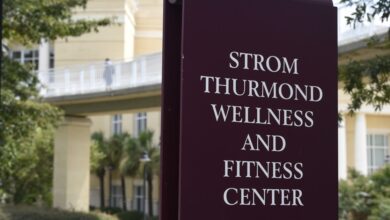Does the ‘Liberty Way’ Discourage Students From Reporting Sexual Assault?

[ad_1]
A news investigation and a lawsuit brought by more than 20 women against Liberty University raises concerns about whether its honor code — called the Liberty Way — discourages students from reporting sexual violence.
Liberty, a university founded by the Christian evangelist Jerry Falwell Sr., requires students to abstain from sex before marriage, as well as drinking alcohol or smoking. Violating the rules can result in a fine, a requirement for community service, or even expulsion. But women who report being victims of sexual violence have repeatedly found themselves in jeopardy of violating the code of conduct, according to a lengthy investigation by the news organization ProPublica, while men accused of sexual assault are found not responsible.
In addition, a lawsuit filed in July by a dozen women, former students and employees, echoes the concerns about the honor code and alleges the university mishandled their complaints of sexual misconduct. Ten more women joined the suit as plaintiffs this month. Most recently, a former administrator sued Liberty, accusing the institution of having fired him in retaliation when he challenged how the university was handling claims of sexual misconduct, according to a report from Politico.
Most conservative faith-based colleges have similar codes of conduct that are meant to reflect their strict adherence to religious morals. But unlike Liberty, many of those institutions are recognizing that it’s more important to encourage students to report sexual misconduct than to enforce conduct-code provisions that might keep them silent, said Scott Schneider, a lawyer with the firm Husch Blackwell who specializes in cases involving sexual misconduct.
“The trend is toward creating places where a student is not discouraged from reporting sexual violence for fear of violating a less-serious offense,” he said.
Five years ago, Brigham Young University made a big change in how it handles reports of sexual misconduct involving students. Students who reported being victims of sexual violence, the university announced, would be immune from other possible violations of the BYU’s “Honor Code,” which forbids consumption of alcohol, premarital sex, and even being in the bedroom of a student of the opposite gender.
The change was seen as long overdue at the faith-based university after many students said they faced expulsion or some other punishment after reporting that they had been assaulted by another student. Using a code of conduct against a sexual-assault victim can appear to blame the victim for the violence committed against them.
There are already enough impediments to students coming forward with complaints, Schneider said, and colleges should err on the side of improving reporting.
Even when the code of conduct is not being used formally, the religious views are an indispensable part of the institution’s culture , said Melissa M. Carleton, a higher-education lawyer with the firm Bricker and Eckler.
That can have an effect on the college’s reaction to sexual violence. At Baylor University, a 2016 investigation by the law firm Pepper Hamilton concluded that university authorities sometimes responded to reports of sexual violence in ways that sounded like victim-blaming — by faulting an accuser for drinking and attending a fraternity party, for example.
Since then, Baylor has adopted an amnesty provision, stating that those who report sexual misconduct will not face disciplinary action for alcohol or drug use or for violating the sexual-conduct policy.
“It’s hard because these codes often go to the heart of their mission,” said Carleton, “but as more complaints come in, these institutions are recognizing more and more the need to provide broader amnesty to encourage people to come forward.
“Otherwise, these institutions run the risk of graduating pastors and religious leaders that decidedly do not represent their values, ” she said, “but have never been turned in due to the lack of protection for the complainants.”
[ad_2]
Source link






